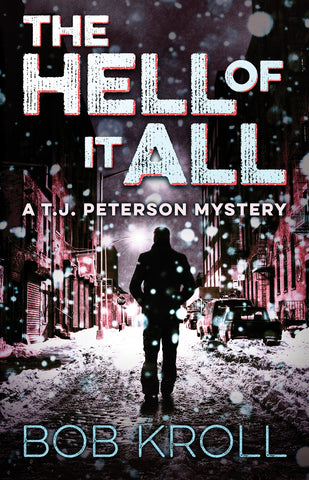“A solidly plotted mystery that should entertain old-school hard-boiled crime fans looking for a new author.” — Booklist
“[A] thriller of detection.” — Toronto Star
“Kroll understands that no matter how complicated the mystery it's the personalities populating the pages that keep readers coming back. . . A solid crime thriller that leaves the reader wanting more." — Atlantic Books Today
Retired detective T.J. Peterson is working the table scraps that his former partner, Danny Little, sometimes throws his way. One of them has Peterson hearing from a snitch about a body buried 30 years ago, the same time a drug kingpin went MIA. Peterson is also ducking an ex-con with a grudge, a hitman who likes playing jack-in-the-box with a 12 gauge. Then a former lover re-enters Peterson’s life and begs him to find her daughter, an addict who knows too much about the local drug trade for her own safety.
Like what you read? Buy a copy of The Hell of It All, get Bob Kroll's previous book, The Drop Zone, for just $5! Shop here.


Peterson swung the black Jetta onto the shoulder of the narrow coastal road, grabbed the cell phone from the shotgun seat, and caught the call on the fourth ring.
“You’re late,” a man’s voice said.
“I’m five minutes away.”
“I don’t like it, man.”
“Just sit tight!”
“Five minutes, and I’m counting.”
The phone went dead, and Peterson gunned it. In the darkness, he missed the snowed-in path to the beach and squealed to a stop. He scowled at his mistake, then popped the transmission into reverse, backed up, and made the turn into the icy snowmobile ruts.
Scrub spruce and alders raked both sides of the Jetta. The occasional frost-heaved boulder ground hard against the undercarriage. Peterson heard a snowmobile roar to life not far away. Then the path took a wide turn and abruptly ended in a small clearing surrounded by snow-matted grass. At the far end, a heavy-set man in a black snowmobile suit and black helmet stood beside his machine.
Peterson knew him as a low-level criminal with big dreams; the kind who talks speed but cruises twenty clicks under the limit. His name was Harvey Roop, but because of the way he hunched over, as though he were carrying a heavy shell on his back, everyone called him Turtle.
Peterson reached for the .38 Ruger in the glove box and climbed from his car. He shoved the gun into the right-hand pocket of his brown field coat. He could taste the salt air in the cold wind off the ocean and looked over to where he heard waves breaking against the rocky shore. In the moonlight, he saw their crests bright with foam and the dark shapes of wild pea and rose bushes poking through the snow.
Then Turtle snapped on a heavy-duty flashlight and blasted the beam into Peterson’s eyes. Peterson hollered for him to aim it somewhere else.
“I don’t like being here with you,” Turtle said, his voice muffled through the helmet. He crossbeamed the path Peterson had driven down.
“You’re the one dressed like Darth Vader,” Peterson said.
Turtle shut the flashlight, then leaned over the snowmobile and killed the motor. He removed the helmet and set it on the seat. He worked a wad of gum in his mouth.
“They dump you from the payroll, so how come you still doing them favours?” he said.
Peterson didn’t answer.
“Pensioned off for head games, right? That’s what I heard. You seeing a shrink?”
Peterson didn’t answer.
“I mean what’s with that?” Turtle said, talking with his gloved fingers as much as his mouth. “A girl cuts herself and bleeds to death, so what? I thought cops see it all the time. Car accidents and blood all over the goddamn road. Like that old guy the other day in a half-ton that took out a tollbooth on the bridge. I didn’t see it, but I heard. The guy goes through the windshield. You see that shit a hundred times, you get used to it. Like doctors do. I don’t mean the ones with the flu shot. I mean the ones who cut you open and fuck around with your insides.”
“You got something to tell me?” Peterson said.
Turtle pushed his head forward and frowned. “You’re the one begging for what I got.”
“You called us.”
“I called Danny, and Danny sends you.”
“Danny didn’t send me. We work together.”
“That’s not what I heard.”
“What did you hear?” Peterson said, hiding the discontent he’d been feeling ever since administration had labelled him a psych case and shown him the door to early retirement. Now he was getting the same dismissal from the bottom.
“I heard Danny only feeds you table scraps,” Turtle gloated. “And I heard you’re working them hard to get back in the department.”
Peterson took it on the chin.
“That puts you on the B-team,” Turtle continued.
“Danny sends you, maybe Danny don’t think what I got is any good.”
“What do you got?”
“Not how it’s done. I get something before I give, a guarantee or something.”
“No guarantee. First you give, and if what you give works out, then you get.”
“Danny and me work it different. I’m talking favours, here. Only now I’m wondering if you can pull through on the favour I want.”
“What favour’s that?”
“Whatever favour I need.”
“Like finagling the child abandonment charge against your old lady?”
That caught Turtle off guard. He shifted his weight.
“You think I’m an errand boy?” Peterson said. “You thought wrong. You’re holding both ends of the same stick. Wrong word whispered in the wrong place, and someone opens you like a Ziploc. You’re no undercover hero. You’re a goddamn snitch!”
Turtle’s mouth moved, but no words came out.
“So what’s your bargaining chip?” Peterson pressed. “Otherwise I’m out of here, and your name gets scratched off the list. And you know what that means — you get no calls, no favours, and no insurance when the time comes and you need a good word for whatever charge comes your way. And if that’s not enough, try this on for size: The nice-guy call to child services about your old lady, the call Danny was going to make, it doesn’t happen.”
Turtle swallowed his first few words, then tried again. “I overhear things, bits and pieces. I take what I get, you understand? I don’t ask questions.”
“What are you not asking questions about?”
“About rag asses jumping drug deals, you hear what I’m saying? Wearing masks and shit. Heavy duty. They’re muscling hand to hand. Strictly petty cash. Pissing off a lot of people.”
“Like who?”
“Like Sammy O.”
“You brought me out here to talk about Sammy O pissed off at someone ripping off drug dealers? You got to be kidding, right?” Peterson knew Sammy O as a six-foot overweight slob who swaggered around the north end. Sammy and his boys casing the neighbourhood meant bad news for anyone getting in their way.
“There’s a body too.”
“What body?”
“Buried in Laurie Park, like thirty years ago.”
“Whose body?”
“They didn’t say.”
“Who didn’t say?”
“That’s something I ain’t giving right now.”
“And when are you giving it?”
“After you find the body, and I get what I want.”
“Where in the park?”
“In the campground.”
“It must be forty acres under six inches of snow. You got a campsite number?”
Turtle shook his head.
“We’re talking holes again, Turtle. The last time, you had us digging holes like we were gophers.”
“The last time was on someone else’s say-so,” Turtle said. “This one I heard myself. And what are you griping about? The last time, you found the body.”
“But not where you said it was.”
“You never knew Jonah was missing. It was my heads-up that got the cops looking for Jonah. Same thing with what’s buried in the park. So I put something on the table, and now it’s your turn to put something up.”
“For rag asses and a thirty-year-old body buried someplace you don’t know.”
“A campsite.”
“But you don’t know the number. There could be thirty, forty, maybe a hundred campsites in the park. You want us to dig up every one on your say-so?”
Turtle squirmed. He picked up the helmet from the snowmobile seat and put it back down. “The body’s for real,” he said. “I heard them talking.”
“But you’re not telling who you heard. Here’s the thing, Turtle, it’s not a meat sandwich if you leave out the meat.”
Turtle’s face went through ten shapes of anxiety. Then he said, “It stays with you, right?”
“Me and Danny.”
“You and Danny, but nobody else.”
“Cross my heart and hope to die.”
“The hell with you and that kid stuff.”
“Just tell me what you got.”
“I heard Willie Blackwood say something to this other guy. I don’t know who. I never got a good look.”
“Where was that?”
“Willie has a camp upcountry, and he was there with his snowmobile pals.”
“Not your kind of company. What are you doing there?”
“I’m not riding with them. I show an hour later. They have me packing the blow, so if they get stopped on the highway, they’re clean. Then one of the machines goes down, and I’m outside pulling spark plugs and cleaning them. That’s when I heard Willie talking.”
“You heard what, exactly?”
“The guy said, ‘We do the fucker and dump him where he can’t be found.’ Then Willie said, ‘Try a campground.’ He said, ‘Who walks a campground looking for a grave?’ The guy left and Willie said to that friend of his, you know, big fucking nose, Willie’s muscle, the one they call Come On . . .”
“Cameron,” Peterson said.
“Yeah. Willie said to him about burying one in Laurie Park thirty years ago. Nothing but bones now. Like a place that nobody finds.”
“And that’s all Willie said?”
“Yeah.”
“When was this?”
“The day after it snowed.”
“Two weeks and you’re bringing it now?”
“I ain’t the fucking mailman.”
Peterson thought about it a moment. “Tell me more about the rag asses. Strictly low level?”
“Dollar store.”
“They’ve got nothing to do with the body in the park?”
“You going deaf or something? The rag asses don’t mean shit.”
“You think Willie knows the campsite number?”
“How do I know what Willie knows? If he put it there he knows. But that ain’t something he goes around talking about. And we don’t shack together. If the man talks in his sleep, I ain’t going there, I ain’t hearing it.”
